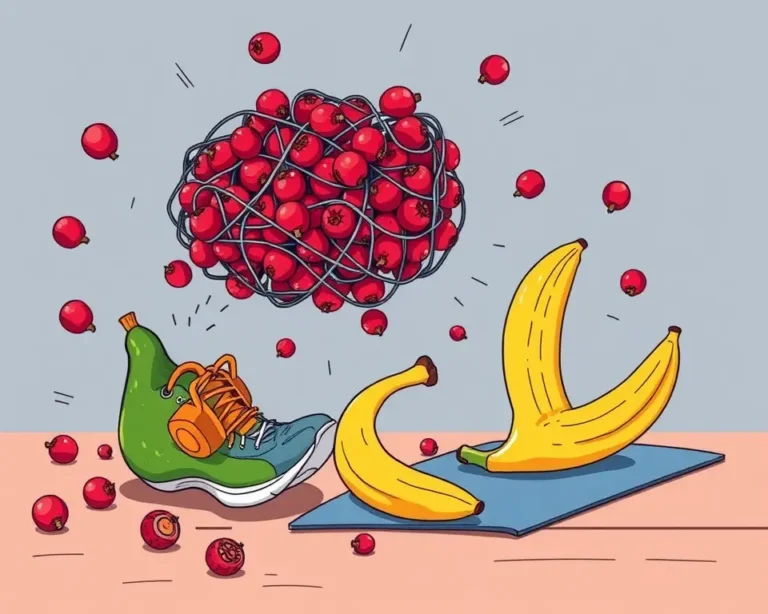Many people meticulously plan their workouts, but often overlook the crucial role nutrition plays in maximizing their efforts. It’s a common misconception that all healthy foods are beneficial before exercise. In fact, some seemingly virtuous choices can actually hinder your performance, causing discomfort and reducing your energy levels. Understanding which “healthy” foods to avoid before a workout is key to optimizing your fitness routine.
The Importance of Pre-Workout Fuel
The food you consume before exercising significantly impacts your energy levels, strength, endurance, and overall motivation. Properly fueling your body ensures you have the necessary resources to perform at your best. It’s not just about eating; it’s about eating the right things at the right time. For activities lasting less than 60 minutes, a small snack may be all you need to keep hunger at bay, but for longer or more intense workouts, the right fuel becomes critical.
Foods to Avoid Before Exercise
While a balanced diet is essential for overall health, certain foods, though healthy, can cause problems when consumed right before a workout. Here are some common culprits:
High-Fiber Foods
While fiber is crucial for digestive health, it can be detrimental if consumed too close to exercise. Foods like whole-grain bread, brown pasta, and cruciferous vegetables such as broccoli, cauliflower, and Brussels sprouts are high in fiber. These foods take longer to digest, which can lead to bloating, gas, and abdominal pain during your workout. The delayed digestion can also cause an energy lag, as your body works harder to break down the food instead of focusing on your physical exertion.
- Why they are problematic: High-fiber foods slow down digestion, potentially causing discomfort.
- Better alternatives: Opt for easily digestible carbohydrates like a small bowl of quick-cook porridge or a banana.
Protein Bars
Protein bars are often marketed as a quick and healthy snack, but many can be problematic before exercise. Some contain high amounts of fiber, sugar, and artificial ingredients, which can lead to digestive issues and energy crashes. While protein is important for muscle repair, it’s not the ideal fuel source right before a workout.
- Why they are problematic: Often high in fiber, sugar, and artificial ingredients, causing stomach issues.
- Better alternatives: Choose a small piece of fruit or a few crackers with low-fat cheese.
Yogurt
Yogurt, a common pre-workout snack, can cause tummy aches if eaten just before exercise. This is due to the lactose content, which can be difficult for some people to digest, leading to discomfort and reduced performance.
- Why it is problematic: Lactose can be difficult to digest, causing stomach upset.
- Better alternatives: Try a small portion of fruit or a smoothie made with plant-based milk.
Fried and Fatty Foods
Fried foods and other high-fat items are generally difficult for the stomach to digest and can leave you feeling sluggish and weighed down. The fat content also relaxes the sphincter between the stomach and esophagus, increasing the likelihood of heartburn during exercise.
- Why they are problematic: They take longer to digest, causing sluggishness and potential heartburn.
- Better alternatives: Choose a lighter option like a piece of fruit or some whole-grain crackers.
Spicy Foods
Spicy foods can cause heartburn and stomach discomfort during exercise. The heat and spices can irritate the digestive system, leading to an unpleasant workout experience.
- Why they are problematic: They can cause heartburn and stomach discomfort.
- Better alternatives: Opt for mild, easily digestible foods.
Nuts
While nuts are a healthy snack, their high-fat content makes them less suitable for pre-workout consumption. They take longer to digest and can cause digestive discomfort during exercise.
- Why they are problematic: Their high fat content slows digestion.
- Better alternatives: A small portion of fruit or some crackers is better.
Ready Meals
Ready meals, often high in fat and sodium, can cause digestive issues and a lack of energy during workouts. They are often heavily processed and lack the necessary nutrients for optimal performance.
- Why they are problematic: Often high in fat and sodium.
- Better alternatives: Prepare a balanced snack at home.
Sugary Drinks and Candy
Sugary drinks and candy provide a quick burst of energy, but this is typically followed by a crash, leaving you feeling sluggish during your workout. These options lack sustained energy and essential nutrients.
- Why they are problematic: They lead to energy spikes and crashes.
- Better alternatives: A piece of fruit or a small whole-grain snack.
Creamy Foods and Sauces
Creamy foods and sauces are high in fat and can cause the same problems as fried foods, leading to sluggishness and digestive discomfort.
- Why they are problematic: They can cause sluggishness and digestive discomfort.
- Better alternatives: Opt for lighter sauces or avoid them altogether before exercise.
Heavy Meals
Eating a large, heavy meal too close to your workout can cause stomach cramps and hinder your performance. It’s crucial to allow enough time for the food to digest before engaging in physical activity.
- Why they are problematic: They lead to stomach cramps and compromised performance.
- Better alternatives: Eat a small, easily digestible snack 1-2 hours before exercising, or a larger meal 3-4 hours prior.
What To Eat Before a Workout
Instead of the foods listed above, focus on easily digestible carbohydrates for quick energy, with a small amount of protein to sustain your muscles. Good options include:
- Bananas: A quick and easily digestible source of carbohydrates.
- Quick-cook porridge: Provides moderate fiber and sustained energy.
- Low-fat yogurt or milk: A source of protein and quick energy.
- Whole-grain crackers: An easily digestible carbohydrate source.
- Fruit smoothies: Offer quick energy and are easily digestible.
- Energy bars (with caution): If choosing a bar, opt for low-fiber and low-sugar options.
- Sports drinks: Can be helpful for longer workouts to provide hydration and electrolytes.
- Small portion of fruit: Easy to digest and provides quick energy.
Timing is Key
The timing of your pre-workout snack or meal is just as crucial as what you eat. If you plan to exercise within an hour of eating, opt for a light snack. If you have more time, you can eat a larger meal 2-3 hours before your workout.
Listen to Your Body
Pay attention to how your body reacts to different foods before a workout. Everyone is different, and what works for one person might not work for another. Experiment with different options and find what best fuels your body.
The Takeaway
While many healthy foods are essential for a balanced diet, they aren’t always the best choice right before exercise. By understanding which foods to avoid and opting for easily digestible carbohydrates and a small amount of protein, you can maximize your workout performance and achieve your fitness goals. It’s about making informed choices that support your body’s needs for optimal energy and performance.







